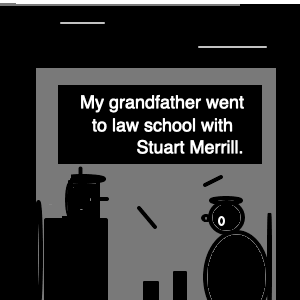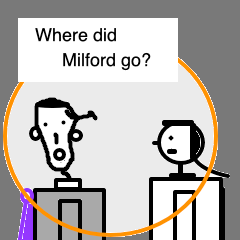In the little hallway outside the men’s room door Milford stopped and looked at the fountain pen he still held in his hand, the pen that had just been given to him by none other than T.S. Eliot, the most acclaimed poet (thus far) of the 20th century. And now the pen was Milford’s – it was his, to write the works that would make him the voice of his generation!
Or, rather, would it be just one great, massive, all-encompassing work? A sprawling epic that would take years, perhaps decades to write? Yes, that was the ticket! No half-measures.
Let it be a thousand, two thousand pages long, whatever it took, full speed ahead and damn the torpedoes!
However, he would publish it in installments. What would be the point of laboring alone in obscurity through the long years, only to achieve his destiny when he was middle-aged or old and teetering on the edge of the grave? No, the serial route would be best. Burst onto the scene with Part One (Canto One? Chapter One? Book One? He would decide what to call it later), taking the literary world by storm, and leave the bastards clamoring for more!
But let them wait, he would publish the succeeding cantos, chapters, or books on his own timetable, and let the publishers with their entreaties and blandishments be damned!
“Hey, buddy, you waiting to get in the men’s room?”
“What?” said Milford.
It was a slender man with a thin moustache, a snap-brim hat, and a worn brown leather workman’s jacket.
“I said and I repeat, you waiting to get in the men’s room?”
“What? No.”
“Just standing here looking at your pen, huh?”
“Yes.”
“So there ain’t a line to get into the gent’s.”
“No. There’s only one person in there, and there’s two urinals, and also a toilet stall.”
“So I can go in.”
“Yes,” said Milford.
“If you’re standing here trying to turn a trick, I ain’t judgmental, Jack.”
“What do you mean, turn a trick?”
“If you got to ask, then you probably ain’t trying to turn one.”
“Well, anyway, as I say, there’s only one man in there, so you’re free to go in.”
“Can I just ask you one question before I do go in?”
“What?”
“Why were you standing here staring at that pen?”
“I’d rather not say.”
“I think I know why.”
“Really?”
“Yes. You’re a poet, and you’re thinking of all the great poems – or, perhaps, one great epic masterwork – that you’re going to write with it.”
“How did you know?”
“Because I too am a poet.”
“Oh.”
“And a poet always knows another poet.”
“Oh.”
“Also, every other cat in this joint is a poet.”
“Oh.”
“I don’t mean that in the sense of every single cat in here, but rather in the sense of every other cat, in other words, approximately half of them. The other half are a mix of experimental novelists, jazz musicians, and abstract painters.”
“Well, anyway, as I say, the rest room is free, or free enough.”
“But you say there’s one guy still in there.”
“Yes.”
“He ain’t a fairy, is he?”
“He says he isn’t.”
“Oh, so you talked to him.”
“Well, he talked to me.”
“So he might be a fairy. Not that I mind, mind you. Fairies gotta live too, y’know.”
“Of course.”
“Slick’s my name. They call me Detroit Slick.”
“Your name is Slick?”
“That’s half my name. Full name, Detroit Slick. What’s your moniker?”
“Milford.”
“First or last name?”
“Listen, sir, don’t you have to go to the bathroom?”
“Don’t rush me, pal. Let me tell you something, you’ll never get to be a real poet if you don’t learn to have random conversations with strangers.”
“I want to rejoin my friends.”
“But are they really your friends?”
Milford sighed, and put the pen away inside his peacoat.
“Oh,” said the guy. “I get it.”
“Get what?”
“I’ve touched a nerve.”
“You’re getting on my nerves, if that’s what you mean.”
“Oh. Okay. I can take a hint. You want to take it outside?”
“What? No, why would I want to take it outside?”
“So we can fight it out like real men. And then after I beat you to a gibbering pulp, maybe I’ll bring you back inside, and we can get drunk together, like real poets.”
“I don’t drink.”
“You what?”
“I don’t drink.”
“You sure you ain’t a fairy?”
“Yes, I’m sure I’m not a fairy.”
“You don’t sound too sure.”
“Well, it’s none of your business anyway.”
“You ever made the beast with two backs with a chick?”
“I refuse to answer that question.”
“In other words, no,” said the guy. “You’re a virgin. And possibly a fairy.”
“Okay, look,” said Milford, “excuse me, but I’m going to rejoin my friends now.”
“Your so-called friends.”
“Fine, my so-called friends.”
“I think we should be friends.”
“Why, in God’s name?”
“There is no God.”
“Okay, I agree – then, simply, why? Why should I want to be your friend?”
“You really know how to hurt a guy.”
“But you’re annoying. You know what, you should quickly go in the men’s room because the man in there is just as annoying as you are. You can have an annoying contest.”
“He’s been in there a long time. He ain’t making a number two, is he?”
“I haven’t the faintest idea.”
“He probably is a fairy then.”
“Again, he says not.”
“Okay, I guess I’ll go in then. But when I come out I’d like to buy you a drink.”
“I told you, I don’t drink.”
“Then what the hell are you doing here?”
“I came in here supposedly to have dinner with a young lady, but – oh, why am I telling you this?”
“Because I asked you. I’m gonna tell you again, Jeffrey –”
“Milford.”
“I’m gonna tell you again, Milford, if you don’t open up yourself to all of life, with all its glories and horrors – and, yes, annoyances – you will never be a great poet.”
“Okay.”
“You know I’m right.”
“Yes, I suppose you are.”
“No man is an island, Howard.”
“Milford. My name is Milford.”
“No man is an island, Milford. We are more like one great vast continent.”
“That makes no sense.”
“One great vast ocean?”
“Why do we have to be anything, islands or whatever? Can’t we just be what we are – people?”
“You got something against metaphor?”
“Look, I’m going to go now, nice talking to you, Mister –”
“Slick, Detroit Slick.”
“Mr. Slick.”
“Just Slick will do.”
“Okay, nice talking to you, Slick.”
“Put ‘er there, Alfred.”
Milford decided on the spot not to correct the man again. What did it matter? He extended his hand, and the man took it in his, which, like Milford’s, was uncallused and devoid of obvious strength, although it was slightly sticky.
“Two poets,” said the man. “Pledging friendship and unanimity, for life.”
Milford bit his lower lip, choosing to say nothing.
The man released Milford’s hand, and Milford immediately wiped the palm of his hand on the side of his dungarees.
“Okay,” said the guy, “I’m gonna piss myself if I don’t go in there right now. Later.”
He opened the door and T.S. Eliot was just coming out, cigarette in hand.
“’Scuse me, Pops,” said the man calling himself Detroit Slick, and he held the door to let T.S. Eliot go past. The door closed, and Mr. Eliot looked at Milford.
“You still here?” said T.S. Eliot.
“Yes, I got caught up in conversation with that guy.”
“A poofter?”
“What?”
“Is he a homosexual?”
“I don’t think so. He said he was a poet.”
“Another one,” said T.S. Eliot. “This joint is seething with them. Come on, I’ll buy you a drink.”
“I don’t drink.”
“Don’t fuck with me, Fordham.”
“Milford. My name is Milford.”
“Don’t fuck with me, Milford.”
“I’m not fucking with you. I don’t drink.”
“And you call yourself a poet? I should ask for my pen back.”
For one-tenth of a second, Milford was on the verge of taking the pen out and giving it back, but he didn’t. He really wanted that pen, to write his great epic with.
“Listen, Mr. Eliot,” he said, “I don’t drink because I’m an alcoholic. What I mean is, I can’t drink.”
“If you don’t want to have a drink with me, just say so.”
“Can I just have a ginger ale?”
“You can have anything you want to have, I assure you it’s a matter of complete indifference to me.”
“I’ll have a ginger ale then.”
“All right, let’s go squeeze into the bar.”
“I can’t right now.”
“May I ask why?”
“I have to rejoin some guys at a table.”
“Oh. Okay. ‘Some guys.’”
“No, really, they’re forming a new movement and they want me to join them.”
“Splendid! I’d like to meet these soi-disant ‘guys’ of yours. May I accompany you?”
“Well, I don’t know, I guess so –”
“Come on then, shake a leg, Blanchard.”
Mr. Eliot put his arm in Milford’s, and together the young poet and the old poet forged forth like two ships of war, one seasoned but battle-hardened, the other newly-commissioned but eager, through that churning sea of humanity, shouting men and laughing women, poets, experimental novelists, and abstract painters.






























































